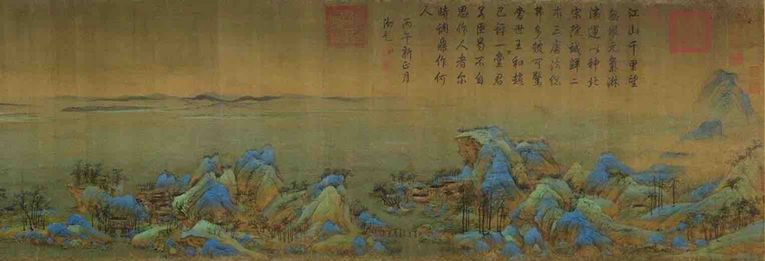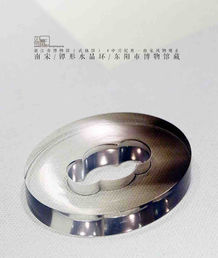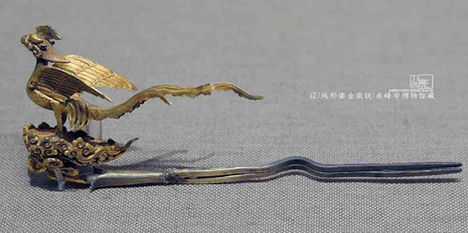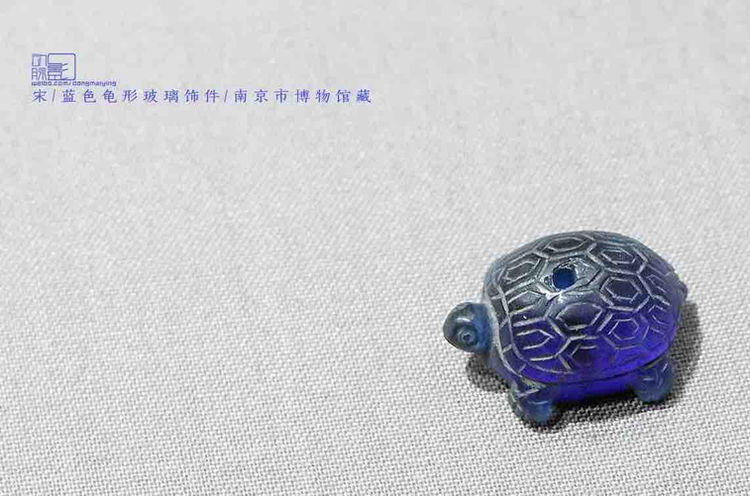Song Dynasty — Wealthy Empire with Highly Respected Scholars
The Song Dynasty (960 — 1279) was an immensely wealthy empire in ancient China, characterized by thriving culture, business, science, technology, and literature. It was an era in which scholars were highly respected, and the power of the emperor and generals was deliberately restrained.
The Song Dynasty was divided into two periods: the Northern Song (960 — 1127) and the Southern Song (1127 — 1279).
The Northern Song came to an end after the Incident of Jingkang in 1127 when Emperors Zhao Ji and Zhao Huan were captured, and a vast portion of their territories was lost.
The Southern Song was re-established in the south in the same year by Emperor Zhao Gou, albeit with a smaller territory.
The Song Dynasty lasted for 319 years and was ruled by 18 emperors.



Along the River During the Qingming Festival or Qingming Shang He Tu, Genre Painting of the Capital City (Bianjing or Kaifeng) of the Song Dynasty by Artist Zhang Zeduan (1085 — 1145) — The Palace Museum
Brief History of the Rise and Fall of the Song Dynasty
Political Structure and Social Systems of the Song Empire
Song Dynasty Achievements in Science and Technology

Dragon Shaped Golden Pendant of Song — Anhui Museum (Photo by Dongmaiying)
Song Dynasty Facts
-
The founder and the first emperor of the Song Dynasty, Zhao Kuangyin, was a master of martial arts; he seized the throne from his young emperor and established the Song Empire.
-
The Song Dynasty had the smallest territory compared to other unified empires in the Middle Kingdom in history.
In addition to the Song Dynasty, other regimes coexisted in Chinese lands during this period, including Liao, Jin, Western Xia, Tubo, Dali, etc.
-
The Song Dynasty was the first dynasty whose population surpassed 100 million in Chinese history.

Ceremonial Jade Weapon (Gu Duo) of the Kingdom Liao — Aohan Prehistory Museum in Inner Mongolia (Photo by Dongmaiying)
-
Small business incubators and paper currency appeared during the Song Dynasty.
Additionally, the first commercial advertisement about steel needles emerged in this era.
-
The Song Dynasty was known to be the most advanced and wealthy kingdom in the world at that time.
-
Tabloids produced by private businesses appeared and became quite popular.
-
The Song Dynasty earned a great deal of money from the shipbuilding industry and international trade along the Maritime Silk Road.

Recovery Model of Unearthed Civil Use Trade Ship of Song — National Museum of China
-
Public transportation, such as paid carriages, was widely used in big cities.
-
The earliest professional fire brigades emerged and were extensively employed in big cities, equipped with an adequate number of observation towers for 24/7 fire monitoring.
Firefighters who delayed or postponed rescue efforts faced punishment.
-
Catering became a professional business in many big cities; the management of guests, provision of various foods and fragrances, decoration, and cleaning all became specialized.

Part of Painting (Wen Hui Tu) by Emperor Zhao Ji (1082 — 1135), Presenting the Feast of Intelligent Scholars — Taipei Palace Museum
-
The cooking method of frying appeared and became popular in this period.
-
Ice cream was first documented in a poem written by the famous poet Yang Wanli.
-
Sumo, including female sumo, was quite popular in the Song era.
-
Rich or talented men usually had concubines and lovers; they could sign contracts with these women (or their families) to keep them only for a certain period.
-
Prostitutes had hierarchies based on their workplace and talents. The official ones were usually beautiful and talented artists, such as Li Shishi.
The Song government published laws to forbid officials from engaging in relationships with prostitutes, whether male or female.

Unearthed Cyan Glaze Tea Cup with A Tray (Zhan Tuo) — Southern Song Government Kiln Museum (Photo by Dongmaiying)
-
As a big and prosperous empire, the Song Dynasty had the smallest royal palace in history.
-
The two capital cities of the Song were not planned in advance, leaving limited space for the royals to build a huge palace, unlike in previous dynasties.
Meanwhile, nearby inhabitants resisted relocation, and Song officials strongly opposed royal spending on unnecessary constructions.
Therefore, despite attempts by some emperors to expand the palace, they were unsuccessful.
-
The Song Dynasty had the most emperors who abdicated their thrones.
-
Many emperors of the Song, whether they were excellent monarchs or not, were also extraordinary artists.
-
A professional Painting Academy was built by Emperor Zhao Ji, who added painting to the Imperial Examination and made significant contributions to Chinese art history.
Thousands of Miles of Mountains and Rivers or Qian Li Jiang Shan Tu, Painted by one of Emperor Zhao Ji’s Students the Artist Wang Ximeng (1096 — 1119) — The Palace Museum
-
The first emperor of the Song, Zhao Kuangyin, introduced a system that sealed everyone's name and transcribed their essays using standard scripts in the Imperial Examinations.
Since then, cheating has become nearly impossible in exams.
-
Emperors themselves would participate in the final round of the Imperial Examinations and decide the champion.
-
Civil officials selected from the Imperial Examination during the Song period were the most highly respected and well-paid in the history of China, enjoying approximately 113 holidays each year.
-
Neo-Confucianism, the dominant ideology of the successive dynasties, was established in the Southern Song by Zhu Xi.
-
The power of military generals had been deliberately restrained during the Song period.

Copper Writing Brush Holder (Bi Jia) of the Song — Zhuji Museum (Photo by Dongmaiying)
-
The Song government provided financial and food assistance to impoverished mothers for raising their children. Support was also extended to poverty-stricken elders and the sick.
-
Hospitals to treat sick travelers were established in major cities.
-
Severe consequences awaited those who made erroneous judgments leading to the death penalty; judges who delivered incorrect sentences faced dismissal, imprisonment, or even the death penalty themselves.

Glass Crossguard (Jian Ge) of Song — Nanjing Museum (Photo by Dongmaiying)
-
The Song Dynasty is the only Chinese dynasty that ended twice due to external invasions, rather than internal rebellions or poor administrations.
The people of the Song Dynasty invented and applied many advanced weapons technologies, including firelocks, giant crossbows, etc.
However, the lack of confidentiality allowed these technologies to be disseminated to nearby regimes, which later used those weapons to fight against the Song.

Part of Ceremonial Guard of Emperor of Song in "Da Jia Lu Bu Tu Shu", Painted Around 1053 to 1065 — National Museum of China
Brief History of the Rise and Fall of the Song Dynasty
Establishing the Song Empire and Seizing Power from Generals
Zhao Kuangyin was a brave general with excellent martial arts skills during the Five Dynasties and Ten Kingdoms (907 — 979).
After his ambitious king departed and passed the throne to a seven-year-old child, Zhao Kuangyin began planning a usurpation.
Several months of preparations later, in the year 960, Zhao Kuangyin took the throne from the young king, defeated his opponents, and named his new kingdom Song.
He subsequently curtailed military power from other generals, establishing the tradition of restraining the general's influence in the Song Dynasty.
This tradition aimed to prevent the rise of powerful warlords, which had been a significant threat during the late Tang Dynasty (618 — 907).

Jade Dragon of Song — Tianjin Museum (Photo by Dongmaiying)
Emperor Zhao Kuangyin’s Excellent Governance and Sudden Death
In the next decade, Zhao Kuangyin, also revered as Emperor Taizu of Song, effectively governed his empire and significantly expanded its territory.
He brought civilians stable and prosperous lives and successfully unified most of the Middle Kingdom.
Unexpectedly, however, Emperor Zhao Kuangyin suddenly passed away after dinner with his brother, who then ascended to the throne as the next emperor.
No one knew exactly what happened that night.
However, his brother, the new emperor Zhao Guangyi, did not match his skills in sovereignty.
Under his rule, Emperor Zhao Kuangyin’s sons all died at young ages, and Song’s army faced failures in many wars, encountering significant losses.
Upon his death, Zhao Guangyi passed the throne to his son.

Gold Cup Carved with Flower Patterns of Song — Shanxi Museum (Photo by Dongmaiying)
Flourishing of the Empire and Signing of the Peace Treaty
The third emperor of the Song was Zhao Heng, also honored as the Emperor Zhenzong of Song.
When the nomadic Kingdom of Liao invaded Song, Zhao Heng was compelled by his determined prime minister to go to the battlefield.
When Song and Liao reached a stalemate, they signed a treaty in which Song agreed to pay a small amount of money to Liao, initiating frontier trade.
This agreement brought peace to the Song Dynasty for half a century.
The next monarch, Emperor Zhao Zhen, implemented reforms and furthered the empire's prosperity.
From that point onward, the Song continued to develop under the governance of successive diligent and capable sovereigns.

Lotus Shaped Azure Glaze Censer of the Song Dynasty — Henan Provincial Institute of Cultural Heritage and Archeology (Photo by Dongmaiying)
Incident of Jingkang and the End of the Northern Song Dynasty
Until Zhao Ji, also revered as Emperor Huizong of Song, ascended to the throne.
Emperor Zhao Ji was one of the most accomplished artists in the history of China, excelling in painting, calligraphy, and poetry.
However, despite his artistic talents, Zhao Ji proved to be a less effective monarch, spending most of his time pursuing art and leisure and making many ill-fated decisions in politics.
Painting and Calligraphy Masterpieces of Zhao Ji the Emperor Huizong of Song
In the north, a nomadic regime named Jin dramatically developed; they defeated and replaced the former Kingdom of Liao and advanced toward the capital city of Song.
However, Emperor Zhao Ji immediately abdicated the throne to his son, Zhao Huan, and escaped to another city.
The Song people achieved victory through intense and strategic battles.
Unfortunately, a few months later, the Jin Kingdom invaded the capital city for the second time.
Zhao Huan, also known as Emperor Qinzong of Song, proved to be another incapable and misguided sovereign. His series of foolish and erratic commands led to the unexpected downfall of the Song Empire.
This shameful event became known as the Incident of Jingkang.
The Jin Kingdom captured the entire royal family of Song and large numbers of civilians, taking them north.
Countless women, from honorable princesses to common civilians, suffered humiliation and enslavement. Princess Duofu and her tragic encounter serve as a typical example.

Unearthed Blue Glass Decorations (Die Sheng) of Southern Song, Homophone of Wishing to Take Back the Two Captured Emperors and Lost Land — Quzhou Museum (Photo by Dongmaiying)
Reestablishment of the Southern Song Dynasty
Meanwhile, Prince Zhao Gou, the ninth son of Emperor Zhao Ji, was in another city when the Incident of Jingkang occurred.
As the only royal prince not imprisoned, he organized all of the Song’s armies, escaped to the south of the Yangtze River, and reestablished the Song Dynasty in the city of Hangzhou.
The Incident of Jingkang took away so much from the Song Empire, fueling the dreams of vengeance for many.
Prince Zhao Gou, now Emperor Gaozong of Song, also decided to attempt the recovery of the lost land after years of being pursued by Jin’s army.

Perfume (Xiang Bing) Blended by Emperor Zhao Gou of the Southern Song, Carved with Characters of "Recovery and Prosperity" — Changzhou Museum (Photo by Dongmaiying)
Forgotten Vengeance and Economic Development
An extraordinary marshal, Yue Fei, was the most glorious hope of the Song court, consistently winning battles and reclaiming numerous cities in the north.
However, Emperor Zhao Gou compelled Yue Fei to relinquish those recovered cities and retreat to the south. Soon after, Yue Fei was betrayed and murdered by a treacherous minister named Qin Hui.
Subsequently, Emperor Zhao Gou and Qin Hui signed an unfair treaty with the Jin Kingdom.
Afterward, the diminished Song in the south began to live peacefully, and their economy continued to progress.
Emperor Zhao Gou, having no sons, selected and adopted a descendant of Emperor Zhao Kuangyin, abdicating the throne at the age of 55.
Since then, he has enjoyed a happy, long, and luxurious retirement.

Part of Exquisite Embroidery Clothes of the Southern Song — Fujian Museum (Photo by Dongmaiying)
Completion of Revenge and the Rise of A Stronger Enemy
This adoptive prince, also the next emperor, Zhao Shen, was an ambitious and diligent monarch who sought to recover the lost territory.
However, he had long been restrained by his retired adopted father, Zhao Gou, as well as by many doves in the government and incapable generals.
Subsequently, the emperors of Song never had the chance to complete the Northern Expedition because the newly risen Mongol Empire, led by Genghis Khan, was growing.
In 1234, the Song court finally allied with Genghis Khan’s troops, perishing the Kingdom of Jin and achieving their long-overdue vengeance.
However, in 1235, Genghis Khan began invading the Song Empire.

Carved Lacquerware Box of the Southern Song — Tokyo National Museum (Photo by Dongmaiying)
End of the Song Dynasty
In the following decades, they continued to fight but remained in a deadlock. During this period, Kublai Khan established the Yuan Empire in the north.
In 1273, after the defeat of the City of Xiangyang, Song lost its most crucial military sites and began to rapidly decline.
Six years later, the Song's last emperor and his people reached a mountain near the South China Sea, where they faced an intense, heroic final battle but ultimately failed.
The last emperor of Song, along with a faithful minister and around 800 royal family members, jumped into the sea.
The remaining 100,000 loyal ministers, soldiers, and civilians of Song either sacrificed themselves in the final battle or chose suicide.
This marked the End of the Song Dynasty.

Sheng Mu Dian (Built in 1023 — 1032) of Jinci Temple, A Valuable Representative Architecture of Song — Taiyuan City, Shanxi Province
Political Structure and Social Systems of the Song Empire
Population
At its zenith, the population of the Song Dynasty is estimated to have reached approximately 126 million.
Political System: Three Departments and Six Ministries
The Three Departments operated independently and reported directly to the Tang emperors:
-
Department of Imperial Secretariats: Responsible for drafting and publishing decrees.
-
Department of Chancellors: Tasked with reviewing decrees by Imperial Censors.
-
Department of Imperial Affairs: The highest authority in state administration, responsible for executing decrees.
Subordinate to the Department of Imperial Affairs are the Six Ministries:
-
Ministry of Personnel: Responsible for the appointment, assessment, and removal of officers.
-
Ministry of Revenue: Manages household registration, finance, and taxation.
-
Ministry of Rites: Oversees ceremony and education.
-
Ministry of National Defense: Handles military affairs.
-
Ministry of Justice: Manages law, judiciary, and punishment.
-
Ministry of Constructions: Responsible for the design and implementation of national constructions.

Fan of the Song with Lacquer Handle — Shaowu Museum (Photo by Dongmaiying)
Official Selection System
The Imperial Examination was widely implemented during the Song Dynasty, allowing individuals with talent to enter the ruling class based on their abilities rather than their class origin.
This process was applied to select both civil and military officials during the period.
Tax System
-
Civilians paid taxes twice a year, in the summer and autumn, using farmland products, textiles, or money. The tax amount and type were typically determined by the extent of their land and property holdings.
-
Capitation.
-
Labor Services, mainly to deal with floods or construction.
Those who performed the services would receive payment, or one could alternatively pay others to do the labor services or pay a certain amount of money to be exempted.

Copper Currency of Song, the Chinese Characters Carved on were Written by Emperor Zhao Ji — National Museum of China
Military Service
Recruitment of Professional Soldiers, compensated by the government, received comprehensive benefits including salary, clothing, and other essentials.
The government extended these benefits to cover the soldiers' families, allowing them to reside together.
Once selected, soldiers were typically bound to their military careers and faced severe consequences, including punishment, if they attempted to flee from battle.
In years of disastrous harvests, the recruitment of famine refugees was a significant source.
Land System
The Song Empire implemented a system of Private Ownership of Land, allowing civilians to own, cultivate, and sell their farmland while fulfilling their tax obligations to the state.

Jade Comb of Southern Song — Nanjing Museum (Photo by Dongmaiying)
Song Dynasty Achievements in Science and Technology
-
Invention and broad application of Movable Type Printing by Bi Sheng.

-
Invention and application of the earliest Paper Money in the world.

Paper Currency (Jiao Zi) of Song
-
Shui Yun Yi Xiang Tai (by Su Song): An astronomical instrument that can observe and demonstrate celestial phenomena, meterage, and tell time.

The Advanced Astronomical Instrument Shui Yun Yi Xiang Tai (Built in 1086 — 1093) of Song
-
The Mathematical Treatise in Nine Sections (by Qin Jiushao): the peak of ancient Chinese math.
It presents 81 mathematical problems, with the Chinese Remainder Theorem and the Positive & Negative Prescription (Horner’s Method) being the most remarkable inventions.
-
Xi Yuan Ji Lu or Collected Cases of Injustice Rectified (by Song Ci): the first Forensic Medicine book in the world.
-
Wide utilization of the Keel Structure and the Nautical Compass in navigation.

Odometer Cart "Ji Li Gu Che" of Song
Song Dynasty Art and Artifacts
Photo by Museum Photographer Dongmaiying
Next: Yuan Dynasty (1271 — 1368) — Half Anarchism
Related Articles:
Brief Introduction to Chinese History
Neolithic Era — Primitive Society and Mythical History
Xia Dynasty (Around 2070 BC — 1600 BC) — the First Hereditary Kingdom in China
Shang Dynasty (1600 BC — 1046 BC) — Empire of Bronze Age and Scripts on Oracle Bones
Zhou Dynasty (1046 BC — 256 BC) — Decency, Hierarchy, and the Feudalism System
Spring and Autumn Period (770 BC — 403 BC) — Great Philosophers and Contention of Warlords
Warring States Period (403 BC — 221 BC) — Wars Among the Seven Kingdoms
Qin Dynasty (221 BC — 207 BC) — Epoch of Great Unification
Han Dynasty (202 BC — 220 AD) — Golden Era of Legendary Civilians
Three Kingdoms, Jin, North & South Dynasties (220 — 589) — Wars and Conspiracy in Turbulent Times
Sui Dynasty (581 — 618) — Transient Age and the Inaugurator of Prosperity
Tang Dynasty (618 — 907) — Flourishing Golden Age
Five Dynasties and Ten Kingdoms (907 — 979) — Decades of Wars and Chaos
Ming Dynasty (1368 — 1644) — Epoch of All Round Prosperity
Qing Dynasty (1636 — 1912) — Extreme Centralization and Closure
Famous Historical Figures in Ancient China
































